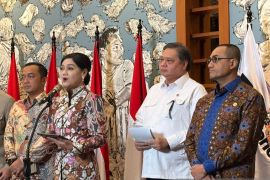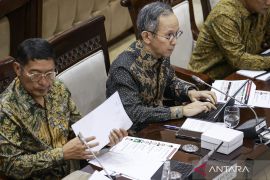Totalling Rp6,742.9 trillion, M2 growth stayed high at 12.3 percent year-on-year (yoy) despite moderating from 13.3 percent (yoy) a month earlier, Executive Director of the Bank Indonesia (BI) Communication Department Onny Widjanarko noted in a statement here, on Monday.
Such developments come amid decreasing M1 growth, from 19.3 percent yoy in August 2020 to 17.6 percent yoy in September 2020, attributable to rupiah demand deposits.
Furthermore, Widjanarko remarked that quasi-money growth decelerated, from 11.5 percent yoy in August 2020 to 10.6 percent yoy during the reporting period.
Meanwhile, Widjanarko stated that securities apart from shares experienced a shallower -13.9 percent yoy contraction during the reporting period as compared to -18.7 percent yoy one month earlier.
Based on the affecting factors, fiscal expansion by the government was the main driver of M2 growth in September 2020. The government expanded fiscal operations during the reporting period, as reflected by a bump in net claims on the central government, from 65.1 percent yoy to 76.7 percent yoy in September 2020.
In addition, growth of Net Foreign Assets (NFA) accelerated to 16.7 percent yoy in September 2020, from 13.8 percent yoy in August 2020, he remarked.
On the other hand, outstanding loans disbursed by the banking industry recorded a growth of -0.4 percent yoy during the reporting period after maintaining positive 0.6-percent (yoy) growth a month earlier, Widjanarko stated.
Indonesia's foreign exchange (forex) reserves at the end of October 2020 stayed high, at US$133.7 billion, albeit decreasing from the September-end position of $135.2 billion, Widjanarko earlier noted
The current reserve level is equivalent to financing 9.7 months of imports or 9.3 months of imports and servicing of government external debt and is above the international adequacy standards of around three months of imports.
"Bank Indonesia considers the foreign exchange reserves to be capable of supporting external sector resilience and maintaining macroeconomic and financial system stability," Executive Director of the BI Communication Department Widjanarko noted on Friday.
Widjanarko explained that the decline in forex reserves in October 2020 was influenced by the payment of government foreign debt, among others.
Widjanarko believes that in future, BI views the foreign exchange reserves as sufficient, supported by stability and maintained economic prospects in line with various policy responses to promote economic recovery.
Related news: Indonesian, Singapore central banks extend financial cooperation
Related news: Islamic economics pivotal to advanced Indonesia vision: BI
EDITED BY INE
Reporter: Azis Kurmala
Editor: Fardah Assegaf
Copyright © ANTARA 2020












